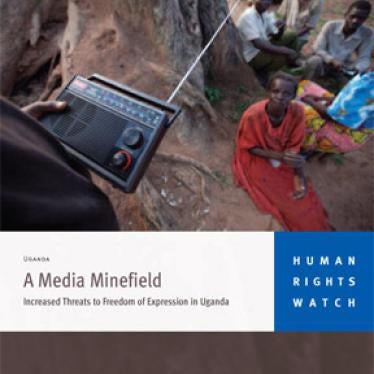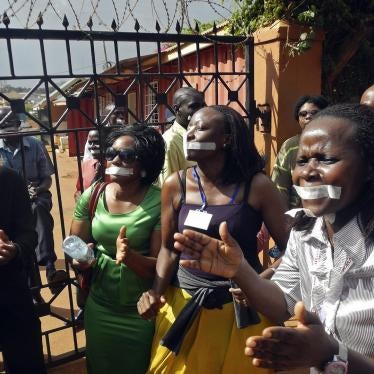(Kampala) - The Ugandan government should ensure that in the lead-in to the forthcoming election, those responsible for any violence are held accountable and that the media can operate free of harassment, Human Rights Watch said today, as the campaign for the 2011 presidential election kicks off. Politically motivated violence and intimidation of the news media have characterized the campaign periods in the past two presidential elections, with new episodes of violence against government opponents in recent months.
"Voters and the news media need to feel safe to debate ideas and to express themselves if Uganda is going to have a free and fair election," said Rona Peligal, Africa director at Human Rights Watch. "It's up to the government to work to prevent abuses that would undermine this crucial campaign period."
The 2001 and 2006 election campaigns were marred by intimidation of the media and the opposition, including arbitrary arrests, partisan prosecution of opposition members, and physical attacks by state actors. All parties participating in the elections should not be using violence, and should strive to ensure that their supporters do not use violence. Politically motivated abuses that occurred in previous elections have rarely been investigated or prosecuted, setting a troubling precedent for 2011, Human Rights Watch said.
This year, Human Rights Watch documented how government authorities have tried to suppress independent political reporting. That was especially true of members of the intelligence organizations and resident district commissioners, officials directly appointed by the president to each district, Human Rights Watch found.
Human Rights Watch found that Ugandan journalists broadcasting in local languages outside Kampala, the capital, where there is limited international scrutiny, are vulnerable and sometimes feel they must censor their own reporting to keep their jobs. The government has also used media and penal laws to harass journalists in Kampala who criticize state policies. Last year, the government's media regulatory bodies, in the absence of any court orders, confiscated transmission equipment from stations broadcasting politically sensitive commentary.
Violence by state actors has not been confined to election periods, with some abuse of opposition supporters reported in 2010. During the campaign period, freedom of assembly is particularly crucial as voters engage in rallies and demonstrations, Human Rights Watch said. Opposition members protesting the composition of the electoral commission were arrested at demonstrations in January 2010 and again in June. Four were seriously beaten by police and had to be hospitalized. An ad hoc group known as the Kiboko (stick) squad has assaulted opposition supporters, claiming to protect businesses from looting, most recently in June. Police stood by and observed the beatings.
The government's intolerance for freedom of assembly is also reflected in the proposed Public Order Management Bill, which would require prior police approval before groups of three or more individuals can gather to discuss "principles, policy, actions or failure of any government."
The lack of accountability for human rights violations by members of the police and military is a troubling backdrop to the elections. Human Rights Watch and other organizations have documented unlawful detention, torture, and extrajudicial killings by security forces and other ad hoc government-aligned security groups.
Uganda's military and political leadership has shown little commitment to curbing violations within their ranks, especially by high-ranking officials implicated in politically motivated violence. For example, the High Court, ruling on civil electoral petitions in 2001 and 2006, determined multiple instances of election-related violence - in some cases by Cabinet ministers and their supporters. Police and the public prosecutor have failed to follow up with investigations or criminal prosecutions.
During the 2006 elections, ruling party members, and security organizations such as Local Defence Units physically assaulted opposition party members, and members of the Ugandan army allegedly threatened opposition candidates planning to campaign in one region. In the 2001 elections, the Kalangala Action Plan (KAP), an informal group created by the ruling party without a mandate, and headed by Maj. Ronald Kakooza Mutale, then a senior presidential adviser, arbitrarily arrested and detained people despite having no legal authority to do so, and violently attacked opposition supporters. No one has ever been held accountable for these abuses.
"This is the government's opportunity to avoid the violence and recriminations of past campaigns," Peligal said. "Unless it takes a strong stand, the government may appear to condone intimidation and violence, and undermine the credibility of the election."





